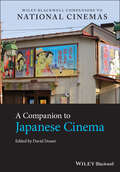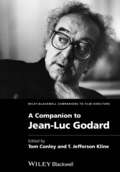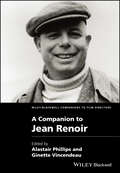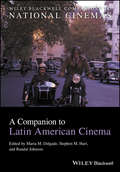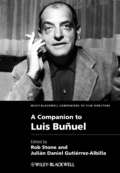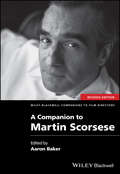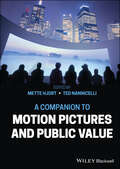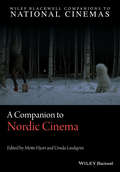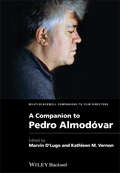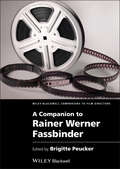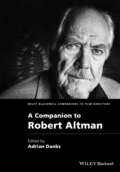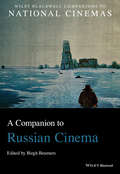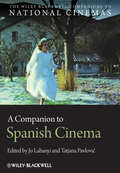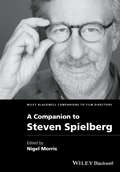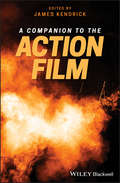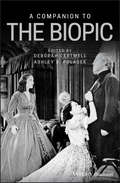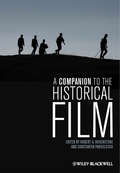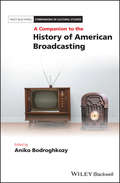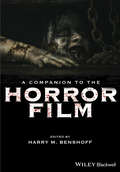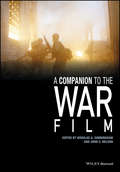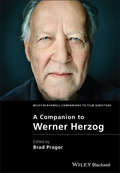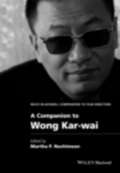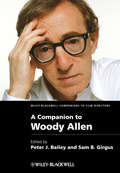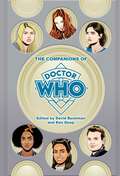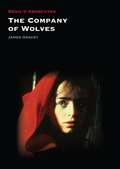- Table View
- List View
A Companion to Japanese Cinema (Wiley Blackwell Companions to National Cinemas)
by David DesserGo beyond Kurosawa and discover an up-to-date and rigorous examination of historical and modern Japanese cinema In A Companion to Japanese Cinema, distinguished cinematic researcher David Desser delivers insightful new material on a fascinating subject, ranging from the introduction and exploration of under-appreciated directors, like Uchida Tomu and Yoshimura Kozaburo, to an appreciation of the Golden Age of Japanese cinema from the point of view of little-known stars and genres of the 1950s. This Companion includes new resources that deal in-depth with the issue of gender in Japanese cinema, including a sustained analysis of Kawase Naomi, arguably the most important female director in Japanese film history. Readers will appreciate the astute material on the connections and relationships that tie together Japanese television and cinema, with implications for understanding the modern state of Japanese film. The Companion concludes with a discussion of the Japanese media’s response to the 3/11 earthquake and tsunami that devastated the nation. The book also includes: A thorough introduction to the History, Ideology, and Aesthetics of Japanese cinema, including discussions of Kyoto as the cinematic center of Japan and the Pure Film Movement and modern Japanese film style An exploration of the background to the famous story of Taki no Shiraito and the significant and underappreciated contributions of directors Uchida Tomu, as well as Yoshimura Kozaburo A rigorous comparison of old and new Japanese cinema, including treatments of Ainu in documentary films and modernity in film exhibition Practical discussions of intermediality, including treatments of scriptwriting in the 1930s and the influence of film on Japanese television Perfect for upper-level undergraduate and graduate students studying Japanese and Asian cinema, A Companion to Japanese Cinema is a must-read reference for anyone seeking an insightful and contemporary discussion of modern scholarship in Japanese cinema in the 20th and 21st centuries.
A Companion to Jean-Luc Godard (Wiley Blackwell Companions to Film Directors #6)
by Tom Conley T. Jefferson KlineThis compendium of original essays offers invaluable insights into the life and works of one of the most important and influential directors in the history of cinema, exploring his major films, philosophy, politics, and connections to other critics and directors. Presents a compendium of original essays offering invaluable insights into the life and works of one of the most important and influential filmmakers in the history of cinema Features contributions from an international cast of major film theorists and critics Provides readers with both an in-depth reading of Godard’s major films and a sense of his evolution from the New Wave to his later political periods Brings fresh insights into the great director’s biography, including reflections on his personal philosophy, politics, and connections to other critics and filmmakers Explores many of the 80 features Godard made in nearly 60 years, and includes coverage of his recent work in video
A Companion to Jean Renoir
by Ginette Vincendeau Alastair PhillipsFrançois Truffaut called him, simply, 'the best'. Jean Renoir is a towering figure in world cinema and fully justifies this monumental survey that includes contributions from leading international film scholars and comprehensively analyzes Renoir's life and career from numerous critical perspectives.New and original research by the world's leading English and French language Renoir scholars explores stylistic, cultural and ideological aspects of Renoir's films as well as key biographical periodsThematic structure admits a range of critical methodologies, from textual analysis to archival research, cultural studies, gender-based and philosophical approachesFeatures detailed analysis of Renoir's essential worksProvides an international perspective on this key auteur's enduring significance in world film history
A Companion to Latin American Cinema (Wiley Blackwell Companions to National Cinemas)
by Maria M. Delgado Stephen M. Hart Randal JohnsonA Companion to Latin American Cinema offers a wide-ranging collection of newly commissioned essays and interviews that explore the ways in which Latin American cinema has established itself on the international film scene in the twenty-first century. Features contributions from international critics, historians, and scholars, along with interviews with acclaimed Latin American film directors Includes essays on the Latin American film industry, as well as the interactions between TV and documentary production with feature film culture Covers several up-and-coming regions of film activity such as nations in Central America Offers novel insights into Latin American cinema based on new methodologies, such as the quantitative approach, and essays contributed by practitioners as well as theorists
A Companion to Luis Buñuel
by Rob StoneA Companion to Luis Buñuel presents a collection of critical readings by many of the foremost film scholars that examines and reassesses myriad facets of world-renowned filmmaker Luis Buñuel's life, works, and cinematic themes. A collection of critical readings that examine and reassess the controversial filmmaker's life, works, and cinematic themes Features readings from several of the most highly-regarded experts on the cinema of Buñuel Includes a multidisciplinary range of approaches from experts in film studies, Hispanic studies, Surrealism, and theoretical concepts such as those of Gilles Deleuze Presents a previously unpublished interview with Luis Buñuel's son, Juan Luis Buñuel
A Companion to Martin Scorsese (Wiley Blackwell Companions to Film Directors)
by Aaron BakerA Companion to Martin Scorsese is a comprehensive collection of original essays assessing the career of one of America’s most prominent contemporary filmmakers. Contains contributions from prominent scholars in North America and Europe that use a variety of analytic approaches Offers fresh interpretations of some of Scorsese’s most influential films, including Mean Streets, Taxi Driver, Raging Bull, Goodfellas, Gangs of New York, and Hugo Considers Scorsese's place within the history of American and world cinema; his work in relation to auteur theory; the use of popular music and various themes such as violence, ethnicity, religion, sexuality, gender, and race in his films, and more
A Companion to Motion Pictures and Public Value
by Mette Hjort Ted NannicelliA singular collection of original essays exploring the varied intersections of motion pictures and public value A Companion to Motion Pictures and Public Value presents a cross-disciplinary investigation of the past, present, and possible future contributions of the moving image to the public good. This unique volume explores the direct and indirect public value developed through motion pictures of different types, genres, and screening sites. Essays by world-renowned scholars from diverse disciplines present original conceptual work, philosophical arguments, historical discussion, empirical research, and specific case studies. Divided into seven thematically organized sections, the Companion identifies the various kinds of values that motion pictures can deliver, amongst them artistic, ethical, environmental, cultural, political, cognitive, and spiritual value. Each section includes an introduction in which the editors outline main themes and highlight connections between individual chapters. Throughout the text, probing essays interrogate the issue of public value as it relates to the cinema and provide insight into how motion pictures play a positive role in human life and society. Featuring original research essays on a pioneering topic, this innovative reference text: Brings together work by expert authors in disciplines such as Philosophy, Political Science, Cultural Studies, Film Studies, Sociology, and Environmental Studies Discusses a variety of institutional landscapes, policy formations, and types and styles of filmmaking Provides wide and inclusive coverage of cinema’s relation to public value in Africa, Asia, China, Europe, the Middle East, and the Americas Explores the role of motion pictures in community formation, nation building, and the construction of good societies Covers new and emerging topics such as cinema-based fields focused on health and wellbeingA Companion to Motion Pictures and Public Value is an ideal textbook for advanced undergraduate and graduate courses in Film, Media, and Cultural Studies, and is a valuable resource for scholars across a variety of disciplines
A Companion to Nordic Cinema
by Mette Hjort Ursula LindqvistA Companion to Nordic Cinema presents a collection of original essays that explore one of the world's oldest regional cinemas from its origins to the present day. Offers a comprehensive, transnational and regional account of Nordic cinema from its origins to the present day Features original contributions from more than two dozen international film scholars based in the Nordic countries, the United States, Canada, Scotland, and Hong Kong Covers a wide range of topics on the distinctive evolution of Nordic cinema including the silent Golden Age, Nordic film policy models and their influence, audiences and cinephilia, Nordic film training, and indigenous Sámi cinema. Considers Nordic cinema's engagement with global audiences through coverage of such topics as Dogme 95, the avant-garde filmmaking movement begun by Danish directors Lars von Trier and Thomas Vinterberg, and the global marketing and distribution of Nordic horror and Nordic noir Offers fresh investigations of the work of global auteurs such as Carl Th. Dreyer, Ingmar Bergman, Lars von Trier, Aki Kaurismäki, and Roy Andersson. Includes essays on Danish and Swedish television dramas, Finland's eco-documentary film production, the emerging tradition of Icelandic cinema, the changing dynamics of Scandinavian porn, and many more
A Companion to Pedro Almdovar
by Kathleen M. Vernon Marvin D'LugoEdited by leading authorities on the subject, and bringing together a stellar cast of contributors, this detailed appraisal of Pedro Almodóvar's unique cinematic art examines the themes, style, and aesthetics of his oeuvre and locates it in the context of the profound cultural transformations in Spain since the 1970s.Brings together a stellar cast of contributors from across the globe including recognized and established specialists as well as talented younger scholars Features contributions by Spanish film historians, where studies of Almodóvar's work have been underrepresented in the academic literatureDeploys new approaches to the analysis of film authorship by exploring contextual issues such as Almodóvar's transnational appeal and the political dimensions of his worksTraces the director's fruitful collaborations in the areas of art and design, fashion and music
A Companion to Rainer Werner Fassbinder
by Brigitte PeuckerA Companion to Rainer Werner Fassbinder is the first of its kind to engage with this important figure. Twenty-eight essays by an international group of scholars consider this controversial director's contribution to German cinema, German history, gender studies, and auteurship.A fresh collection of original research providing diverse perspectives on Fassbinder's work in films, television, poetry, and underground theatre.Rainer Werner Fassbinder remains the preeminent filmmaker of the New German Cinema whose brief but prolific body of work spans from the latter half of the 1960s to the artist's death in 1982.Interrogates Fassbinder's influence on the seminal ideas of his time: auteurship, identity, race, queer studies, and the cataclysmic events of German twentieth century historyContributions from internationally diverse scholars specializing in film, culture, and German studies.Includes coverage of his key films including: Gods of the Plague (1970), Beware of a Holy Whore (1971), The Bitter Tears of Petra von Kant (1972), Martha (1973) (TV), World on a Wire (1973), Effi Briest (1974), Ali: Fear Eats the Soul (1974), Fox and His Friends (1975), Fear of Fear (1975), Chinese Roulette (1976), In a Year With 13 Moons (1978), Despair (1978), The Third Generation (1979), Berlin Alexanderplatz (1980) (TV), and Querelle (1982).
A Companion to Robert Altman (Wiley Blackwell Companions to Film Directors)
by Adrian DanksA Companion to Robert Altman presents myriad aspects of Altman’s life, career, influence and historical context. This book features 23 essays from a range of experts in the field, providing extensive coverage of these aspects and dimensions of Altman’s work. The most expansive and wide-ranging book yet published on Altman, providing a comprehensive account of Altman’s complete career Provides discussion and analysis of generally neglected aspects of Altman’s career, including the significance of his work in television and industrial film, the importance of collaboration, and the full range and import of his aesthetic innovations Includes essays by key scholars in “Altman studies”, bringing together experts in the field, emerging scholars and writers from a broad range of fields Multi-disciplinary in design and draws on a range of approaches to Altman’s work, being the first substantial publication to make use of the recently launched Robert Altman Archive at the University of Michigan Offers specific insights into particular aspects of film style and their application, industrial and aesthetic film and TV history, and particular areas such as the theorisation of space, place, authorship and gender
A Companion to Russian Cinema (Wiley Blackwell Companions to National Cinemas #6)
by Birgit BeumersA Companion to Russian Cinema provides an exhaustive and carefully organised guide to the cinema of pre-Revolutionary Russia, of the Soviet era, as well as post-Soviet Russian cinema, edited by one of the most established and knowledgeable scholars in Russian cinema studies. The most up-to-date and thorough coverage of Russian, Soviet and post-Soviet cinema, which also effectively fills gaps in the existing scholarship in the field This is the first volume on Russian cinema to explore specifically the history of movie theatres, studios, and educational institutions The editor is one of the most established and knowledgeable scholars in Russian cinema studies, and contributions come from leading experts in the field of Russian Studies, Film Studies and Visual Culture Chapters consider the arts of scriptwriting, sound, production design, costumes and cinematography Provides five portraits of key figures in Soviet and Russia film history, whose works have been somewhat neglected
A Companion to Spanish Cinema (Wiley Blackwell Companions to National Cinemas)
by Jo Labanyi Tatjana PavlovićA Companion to Spanish Cinema is a bold collection of newly commissioned essays written by top international scholars that thoroughly interrogates Spanish cinema from a variety of thematic, theoretical and historic perspectives. Presents an insightful and provocative collection of newly commissioned essays and original research by top international scholars from a variety of theoretical, disciplinary and geographical perspectives Offers a systematic historical, thematic, and theoretical approach to Spanish cinema, unique in the field Combines a thorough and insightful study of a wide spectrum of topics and issues with in-depth textual analysis of specific films Explores Spanish cinema’s cultural, artistic, industrial, theoretical and commercial contexts pre- and post-1975 and the notion of a “national” cinema Canonical directors and stars are examined alongside understudied directors, screenwriters, editors, and secondary actors Presents original research on image and sound; genre; non-fiction film; institutions, audiences and industry; and relations to other media, as well as a theoretically-driven section designed to stimulate innovative research
A Companion to Steven Spielberg (Wiley Blackwell Companions to Film Directors)
by Nigel MorrisA Companion to Steven Spielberg provides an authoritative collection of essays exploring the achievements and legacy of one of the most influential film directors of the modern era. Offers comprehensive coverage of Spielberg’s directorial output, from early works including Duel, The Sugarland Express, and Jaws, to recent films Explores Spielberg’s contribution to the development of visual effects and computer games, as well as the critical and popular reception of his films Topics include in-depth analyses of Spielberg’s themes, style, and filming techniques; commercial and cultural significance of the Spielberg ‘brand’ and his parallel career as a producer; and collaborative projects with artists and composers Brings together an international team of renowned scholars and emergent voices, balancing multiple perspectives and critical approaches Creates a timely and illuminating resource which acknowledges the ambiguity and complexity of Spielberg’s work, and reflects its increasing importance to film scholarship
A Companion to the Action Film (Cncz - Wiley Blackwell Companions To National Cinemas Ser.)
by James KendrickAn authoritative guide to the action-packed film genre With 24 incisive, cutting-edge contributions from esteemed scholars and critics, A Companion to the Action Filmprovides an authoritative and in-depth guide to this internationally popular and wide-ranging genre. As the first major anthology on the action film in more than a decade, the volume offers insights into the genre’s historical development, explores its production techniques and visual poetics, and provides reflections on the numerous social, cultural, and political issues it has and continues to embody. A Companion to the Action Film offers original research and critical analysis that examines the iconic characteristics of the genre, its visual aesthetics, and its narrative traits; considers the impact of major directors and stars on the genre’s evolution; puts the action film in dialogue with various technologies and other forms of media such as graphic novels and television; and maps out new avenues of critical study for the future. This important resource: Offers a definitive guide to the action film Contains insightful contributions from a wide range of international film experts and scholars Reviews the evolution of the genre from the silent era to today’s age of digital blockbusters Offers nuanced commentary and analysis of socio-cultural issues such as race, nationality, and gender in action films Written for scholars, teachers and students in film studies, film theory, film history, genre studies, and popular culture, A Companion to the Action Film is an essential guide to one of international cinema’s most important, popular, and influential genres.
A Companion to the Biopic
by Deborah Cartmell Ashley D. PolasekThe most comprehensive reference text of theoretical and historical discourse on the biopic film The biopic, often viewed as the most reviled of all film genres, traces its origins to the early silent era over a century ago. Receiving little critical attention, biopics are regularly dismissed as superficial, formulaic, and disrespectful of history. Film critics, literary scholars and historians tend to believe that biopics should be artistic, yet accurate, true-to-life representations of their subjects. Moviegoing audiences, however, do not seem to hold similar views; biopics continue to be popular, commercially viable films. Even the genre’s most ardent detractors will admit that these films are often very watchable, particularly due to the performance of the lead actor. It is increasingly common for stars of biographical films to garner critical praise and awards, driving a growing interest in scholarship in the genre. A Companion to the Biopic is the first global and authoritative reference on the subject. Offering theoretical, historical, thematic, and performance-based approaches, this unique volume brings together the work of top scholars to discuss the coverage of the lives of authors, politicians, royalty, criminals, and pop stars through the biopic film. Chapters explore evolving attitudes and divergent perspectives on the genre with topics such as the connections between biopics and literary melodramas, the influence financial concerns have on aesthetic, social, or moral principles, the merger of historical narratives with Hollywood biographies, stereotypes and criticisms of the biopic genre, and more. This volume: Provides a systematic, in-depth analysis of the biopic and considers how the choice of historical subject reflects contemporary issues Places emphasis on films that portray race and gender issues Explores the uneven boundaries of the genre by addressing what is and is not a biopic as well as the ways in which films simultaneously embrace and defy historical authenticity Examines the distinction between reality and ‘the real’ in biographical films Offers a chronological survey of biopics from the beginning of the 20th century A Companion to the Biopic is a valuable resource for researchers, scholars, and students of history, film studies, and English literature, as well as those in disciplines that examine interpretations of historical figures
A Companion to the Historical Film
by Robert A. Rosenstone Constantin ParvulescuBroad in scope, this interdisciplinary collection of original scholarship on historical film features essays that explore the many facets of this expanding field and provide a platform for promising avenues of research. Offers a unique collection of cutting edge research that questions the intention behind and influence of historical film Essays range in scope from inclusive broad-ranging subjects such as political contexts, to focused assessments of individual films and auteurs Prefaced with an introductory survey of the field by its two distinguished editors Features interdisciplinary contributions from scholars in the fields of History, Film Studies, Anthropology, and Cultural and Literary Studies
A Companion to the History of American Broadcasting (Blackwell Companions in Cultural Studies)
by Aniko BodroghkozyPresented in a single volume, this engaging review reflects on the scholarship and the historical development of American broadcasting A Companion to the History of American Broadcasting comprehensively evaluates the vibrant history of American radio and television and reveals broadcasting’s influence on American history in the twentieth and twenty-first centuries. With contributions from leading scholars on the topic, this wide-ranging anthology explores the impact of broadcasting on American culture, politics, and society from an historical perspective as well as the effect on our economic and social structures. The text’s original and accessibly-written essays offer explorations on a wealth of topics including the production of broadcast media, the evolution of various television and radio genres, the development of the broadcast ratings system, the rise of Spanish language broadcasting in the United States, broadcast activism, African Americans and broadcasting, 1950’s television, and much more. This essential resource: Presents a scholarly overview of the history of radio and television broadcasting and its influence on contemporary American history Contains original essays from leading academics in the field Examines the role of radio in the television era Discusses the evolution of regulations in radio and television Offers insight into the cultural influence of radio and television Analyzes canonical texts that helped shape the field Written for students and scholars of media studies and twentieth-century history, A Companion to the History of American Broadcasting is an essential and field-defining guide to the history and historiography of American broadcasting and its many cultural, societal, and political impacts.
A Companion to the Horror Film
by Harry M. BenshoffThis cutting-edge collection features original essays by eminent scholars on one of cinema's most dynamic and enduringly popular genres, covering everything from the history of horror movies to the latest critical approaches. Contributors include many of the finest academics working in the field, as well as exciting younger scholars Varied and comprehensive coverage, from the history of horror to broader issues of censorship, gender, and sexuality Covers both English-language and non-English horror film traditions Key topics include horror film aesthetics, theoretical approaches, distribution, art house cinema, ethnographic surrealism, and horror's relation to documentary film practice A thorough treatment of this dynamic film genre suited to scholars and enthusiasts alike
A Companion to the War Film
by John C. Nelson Douglas A. CunninghamA Companion to the War Film contains 27 original essays that examine all aspects of the genre, from the traditional war film, to the new global nature of conflicts, and the diverse formats that war stories assume in today's digital culture. Includes new works from experienced and emerging scholars that expand the scope of the genre by applying fresh theoretical approaches and archival resources to the study of the war film Moves beyond the limited confines of "the combat film" to cover home-front films, international and foreign language films, and a range of conflicts and time periods Addresses complex questions of gender, race, forced internment, international terrorism, and war protest in films such as Full Metal Jacket, Good Kill, Grace is Gone, Gran Torino, The Messenger, Snow Falling on Cedars, So Proudly We Hail, Tae Guk Gi: The Brotherhood of War, Tender Comrade, and Zero Dark Thirty Provides a nuanced vision of war film that brings the genre firmly into the 21st Century and points the way for exciting future scholarship
A Companion to Werner Herzog (Wiley Blackwell Companions to Film Directors #18)
by Brad PragerA Companion to Werner Herzog showcases over two dozen original scholarly essays examining nearly five decades of filmmaking by one of the most acclaimed and innovative figures in world cinema. First collection in twenty years dedicated to examining Herzog’s expansive career Features essays by international scholars and Herzog specialists Addresses a broad spectrum of the director’s films, from his earliest works such as Signs of Life and Fata Morgana to such recent films as The Bad Lieutenant and Encounters at the End of the World Offers creative, innovative approaches guided by film history, art history, and philosophy Includes a comprehensive filmography that also features a list of the director’s acting appearances and opera productions Explores the director’s engagement with music and the arts, his self-stylization as a global filmmaker, his Bavarian origins, and even his love-hate relationship with the actor Klaus Kinski
A Companion to Wong Kar-wai (Wiley Blackwell Companions to Film Directors #13)
by Martha P. NochimsonWith 25 essays that embrace a wide spectrum of topics and perspectives including intertextuality, transnationality, gender representation, repetition, the use of music, color, and sound, depiction of time and space in human affairs, and Wong’s highly original portrayal of violence, A Companion to Wong Kar-Wai is a singular examination of the prestigious filmmaker known around the world for the innovation, beauty, and passion he brings to filmmaking. Brings together the most cutting edge, in-depth, and interesting scholarship on arguably the greatest living Asian filmmaker, from a multinational group of established and rising film scholars and critics Covers a huge breadth of topics such as the tradition of the jianghu in Wong's films; queering Wong's films not in terms of gender but through the artist's liminality; the phenomenological Wong; Wong's intertextuality; America through Wong's eyes; the optics of intensities, thresholds, and transfers of energy in Wong's cinema; and the diasporic presence of some ladies from Shanghai in Wong's Hong Kong Examines the political, historical, and sociological influence of Wong and his work, and discusses his work from a variety of perspectives including modern, post-modern, postcolonial, and queer theory Includes two appendices which examine Wong’s work in Hong Kong television and commercials
A Companion to Woody Allen (Wiley Blackwell Companions to Film Directors #21)
by Peter J. Bailey Sam B. GirgusEdited by two renowned Allen experts, A Companion to Woody Allen presents a collection of 26 original essays on the director’s films. Contributions offer a number of divergent critical perspectives while expanding the contexts in which his work is understood. A timely companion by the authors of two of the most important books on Allen to date Illuminates the films of Woody Allen from a number of divergent critical perspectives Explores the contexts in which his work should be understood Assesses Allen’s remarkable filmmaking career from its early beginnings and investigates the conflicts and contradictions that suffuse it Discusses Allen’s recognition as a global cinematic figure
The Companions of Dr. Who: The Best Of Him (Doctor Who)
by David BushmanDoctor Who fans love to argue: Who's the best Doctor? Who's the best showrunner? And here in this anthology of essays, a roster of Who experts present their arguments for who's the best companion, and come up with some surprising nominations. "Don't be alone, Doctor," Amy Pond tells the Eleventh Doctor in "The Angels Take Manhattan," and of course the irony is that in one sense the Doctor is always alone--a Gallifreyan whose regenerative powers mean he will outlast nearly everyone near and dear to him -- while at the same time he is rarely without one or more trusted companion by his side. This is a book about those companions--those fortunate few who accompany him on his journeys through space and time on--to quote the Ninth Doctor--"the trip of a lifetime." The editors of The Villains of Doctor Who are back with a new anthology of essays--paeans, really--to Donna Noble, Sarah Jane Smith, Rose Tyler, Wilfred Mott, Chang Lee, Clara Oswald, and more. Did your favorite companion make the cut? You're going to have to read to find out! Edited by David Bushman (The Villains of Doctor Who) and Ken Deep (Showrunner of L.I Doctor Who Con) Essays by: Shaun Lyon, Joseph Dougherty, Mackenzie Flohr, Amanda-Rae Prescott, Scott Ryan, Gina R Rosich, PhD, MSW, Joshua Lou Friedman, Yee Jee Tso, Sophie Aldred, Paul J. Salamoff, Charlie Ross, Lucy Chase Williams, Amy Krell, Edwin Thrower, and Barnaby Edwards
The Company of Wolves (Devil's Advocates)
by James GraceyCo-written by Irish filmmaker Neil Jordan and British novelist Angela Carter, and based on several short stories from Carter's collection The Bloody Chamber, The Company of Wolves (1984) is a provocative reinvention of the fairy tale of Little Red Riding Hood. Unraveling a feverish metaphor for the blossoming of a young girl's sexuality and her subsequent loss of innocence, the film entwines symbolism and metaphor with striking visuals and grisly effects. Released in the early 1980s, a time which produced several classic werewolf films (including An American Werewolf in London and The Howling), The Company of Wolves sets itself apart from the pack with its overtly literary roots, feminist stance, and art-house leanings. The film's narrative takes the form of a puzzle box, unfolding as dreams within dreams, and stories within stories, which lead further into the dark woods of the protagonist's psyche, as she finds herself on the cusp of womanhood. This Devil's Advocate explores all these aspects, as well as placing the film in the context of the careers of its creators and its position as an example of the "Female Gothic."
